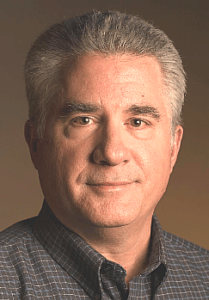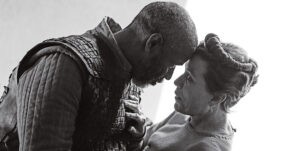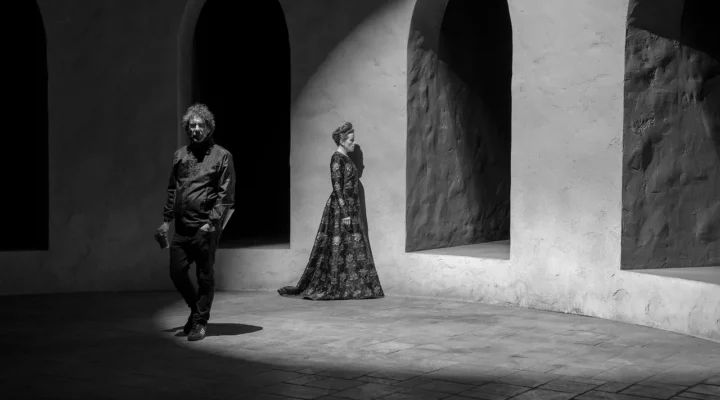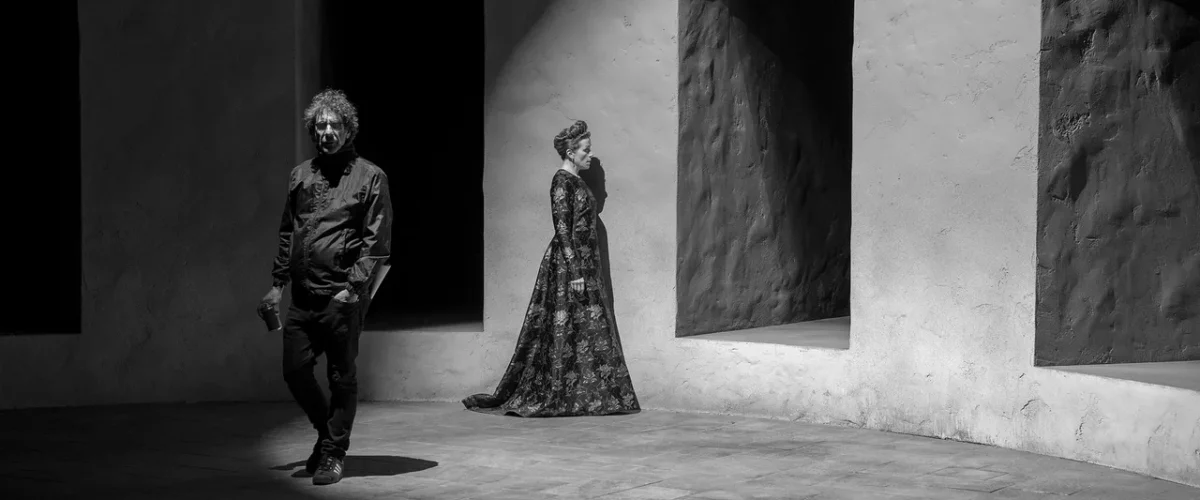Like any good English major, I eagerly await new adaptations of Shakespeare, especially if they involve great actors and directors.
The Tragedy of Macbeth, starring Denzel Washington and Frances McDormand in the title roles and directed by Joel Coen, certainly qualifies. Reviewers have lavishly praised it, with some calling it the best-ever film version of Shakespeare’s bloody story of ambition and murder. (Watch the official trailer here). That’s saying something, considering Macbeth has been adapted for the screen more than 30 times since 1908 — by the likes of Orson Welles, Akira Kurosawa and Roman Polanski.
Yet I hesitate to see it, weeks after its release. We’re in the bleak midwinter of an American dark age, and this stark, stripped-down version of Macbeth provides scant hope for getting out of this mess alive. It’s tempting to stick with comedies and escapist fare.

Erich Bridges
Shakespeare was a master of comedy, but Macbeth is perhaps his darkest tragedy. The ambitious Thane (Scottish nobleman) of Cawdor, egged on by his ruthless wife, murders his visiting king to usurp the Scottish throne, then proceeds to slaughter friends, potential rivals, even innocent children. It is a fearful tale, filled with witches (the “Weird Sisters” are the first characters to take the stage), ghosts, horror, blood, insanity and a supernatural sense of inevitable doom.
Even stagings of the play inspire a certain dread. So many disasters have befallen various productions through the years that superstitious theater people call it “the Scottish play,” not Macbeth, hoping to avoid the supposed curse.
Sound and fury, signifying nothing
But Macbeth remains one of Shakespeare’s most frequently performed plays. Like rubberneckers passing a deadly wreck, we find it hard to turn away from the carnage. Short, relentless and brutal, the story hurtles toward its end: insanity and suicide for guilt-ridden Lady Macbeth, death and beheading for Macbeth at the hands of Macduff, who avenges Macbeth’s murder of his family.
Dramatic tragedians going back to Sophocles have shown audiences the foibles and falls of characters who choose wrong courses, hoping we might learn from them and avoid similar fates. Does Macbeth offer such instruction, or only a descent into darkness? Macbeth’s famous “tomorrow, and tomorrow, and tomorrow” speech after he learns of his wife’s suicide seems to imply the latter:
Tomorrow, and tomorrow, and tomorrow,
Creeps in this petty pace from day to day,
To the last syllable of recorded time;
And all our yesterdays have lighted fools
The way to dusty death. Out, out, brief candle!
Life’s but a walking shadow, a poor player,
That struts and frets his hour upon the stage,
And then is heard no more. It is a tale
Told by an idiot, full of sound and fury,
Signifying nothing. (Act V, Scene V, 19-28)
No passage in the modern literature of existential despair matches the bleakness of these lines. Is there no hope of redemption, no deliverance beyond this brief, grim existence?
“The play’s lasting popularity is … odd because Macbeth is among Shakespeare’s most hopeless works,” writes Isaac Butler in a review of the new film version for Slate. “Macbeth takes place on an ever-spinning wheel, one that cannot be escaped. For all the brutal violence of the play, nothing has been accomplished by its end: The play begins with the defeat of a traitorous Thane of Cawdor and the redistribution of his lands and title, and it ends with the defeat of a different traitorous Thane of Cawdor and yet another redistribution of lands and titles. …
“Emotionally, these events are all too familiar to us today, yet director Joel Coen isn’t interested in finding these kinds of contemporary resonances.”
“Although it’s tempting to imagine that Macbeth originates in a middle-aged Shakespeare becoming the preeminent playwright of his time and having a midlife crisis, the play’s hopelessness likely has political and cultural origins. In the three years prior to Macbeth’s premiere, Shakespeare had seen a plague kill one-fifth of the population of London, and he had also lived through the Gunpowder Plot, a failed insurgency by religious extremists that nearly destroyed Parliament. Emotionally, these events are all too familiar to us today, yet director Joel Coen isn’t interested in finding these kinds of contemporary resonances. As in his previous work with his brother, Ethan, Coen opts out of trenchant political commentary to return to one of his favorite themes: the struggle of the individual to exist in an inscrutable, capricious universe.”
For reference, see the Coen brothers’ previous masterpiece, No Country for Old Men, an even more violent story adapted from Cormac McCarthy’s 2005 novel about helpless innocents at the mercy (and there is none) of a mass murderer, standing in for Random Fate. There’s a tiny ray of hope, perhaps, but it doesn’t come until the very last, quiet, heart-wrenching scene, when Tommy Lee Jones — playing an aging Texas sheriff seemingly defeated by darkness — wonders if any light remains. (Watch it here.)
Pawns or agents?
All this is a long prelude to my central question: Is Macbeth the helpless pawn of irresistible fate, of evil spirits, of witchcraft, of his wife’s manipulation — and by extension, are we as human beings the pawns of a senseless world? No.
Macbeth himself makes his motivation for murder clear in Act I:
I have no spur
To prick the sides of my intent, but only
Vaulting ambition, which o’erleaps itself
And falls on th’ other – (Act I, Scene VII, 25-28)
As soon as the deed is done, he knows he will never sleep in peace again:
‘Glamis hath murdered sleep, and therefore Cawdor
Shall sleep no more, Macbeth shall sleep no more.’ …
I am afraid to think what I have done;
Look on’t again I dare not. (Act II, Scene II, 42, 43, 50, 51)

No one forced Macbeth to murder the king. Not the Weird Sisters. Not Lady Macbeth. Not “Fate” or some dark spirit. He gave in to his “vaulting ambition,” and proceeded to “screw (his) courage to the sticking place,” as his wife coldly suggested, to fulfill it.
“With eyes wide open to the hideousness of his offense, a brave, imaginative and morally sensitive man commits a stealthy murder for gain,” wrote Alfred Harbage, the late, great Shakespeare scholar at Harvard University. “His victim is his guest, his benefactor, his kinsman and his king; and to shield himself from detection he incontinently sacrifices the lives and reputation of two innocent underlings. The retribution is as appalling as the crime — his soul’s slow death in self-horror, degradation, loneliness and despair, then his bloody extermination.”
Or, as Shakespeare himself has Cassius say in Julius Caesar, another tragedy involving political assassination and its bloody consequences:
The fault, dear Brutus, is not in our stars
But in ourselves. (Act I, Scene III, 140-141)
Can’t have it both ways
We moderns claim to be fully autonomous individuals, making our own choices. But when we do wrong, we want to play the victim. We blame psychological issues or physical abuse, past trauma, oppressive social structures. We can’t have it both ways.
Undoubtedly, many innocent people are forced into terrible actions by external forces. But most of us, like Macbeth, freely choose the evil we commit. We can’t blame someone else for our sins.
King David of Israel understood that long before Shakespeare’s mostly fictional Macbeth. No one forced David to commit adultery with Bathsheba (and possibly rape her in his position of royal power), or to arrange the murder of her husband, Uriah, one of his most faithful warriors. He did it all on his own. When he was called out by the prophet Nathan, David fell to his knees before God and cried out:
Wash me thoroughly from my guilt
And cleanse me from my sin.
For I know my wrongdoings,
And my sin is constantly before me.
Against you, you only, I have sinned
And done what is evil in your sight,
So that you are justified when you speak
And blameless when you judge. (Psalm 51:2-4)
We resist making such an admission to God as modern, sophisticated people. Sin emerging from our desperately wicked hearts, and no place else, seems such an outmoded concept. There must another explanation for our miserable decisions.
All things considered, I think I’ll fall to my knees with David.
See The Tragedy of Macbeth, as I intend to, and be warned.
Erich Bridges, a Baptist journalist for more than 40 years, retired in 2016 as global correspondent for the Southern Baptist Convention’s International Mission Board. He lives in Richmond, Va.
Related articles:
Pilate, Kellyanne and us | Opinion by Erich Bridges
Why do we obsess over single tragic events and ignore the greater peril? | Opinion by Erich Bridges
Christian America’s betrayal of the kingdom of God | Opinion by Richard T. Hughes


